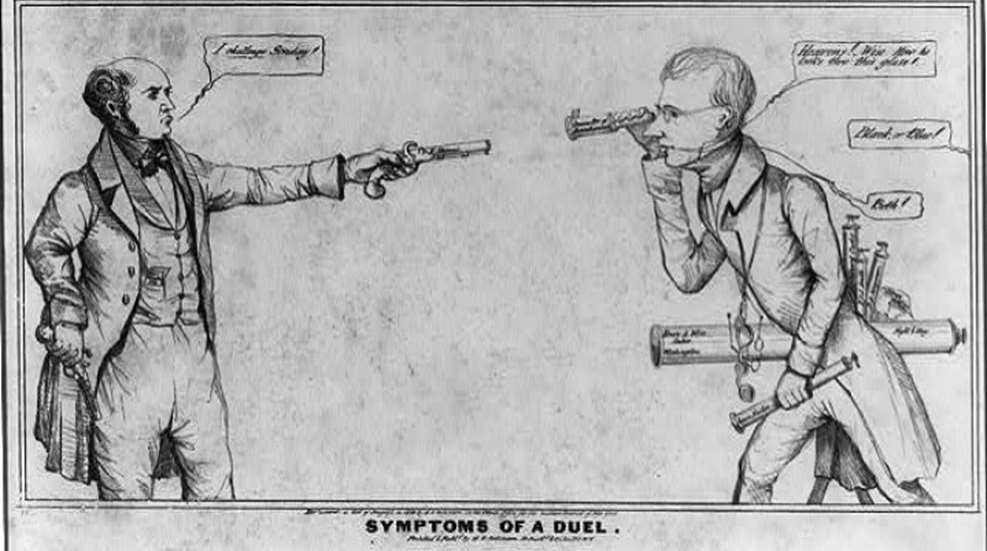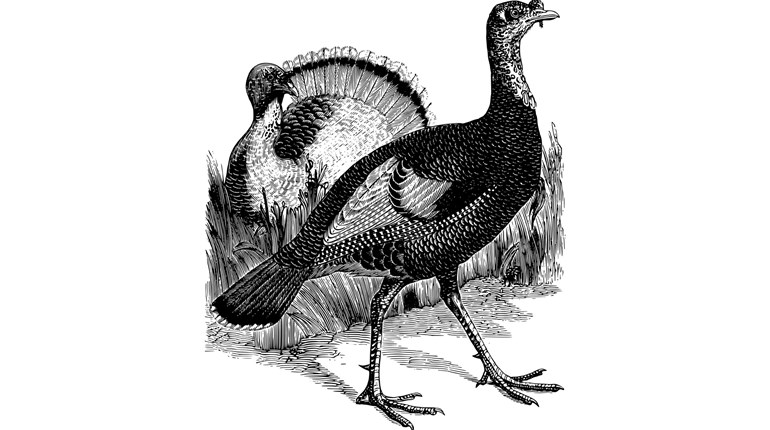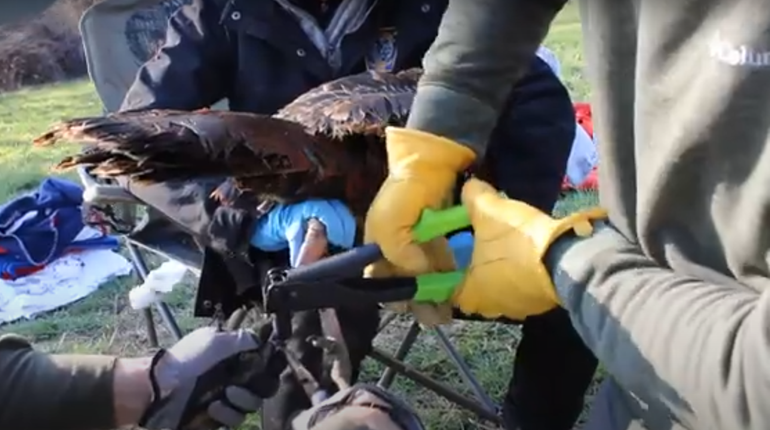
The longest duel in history was also one of the strangest. Fought between two French military officers, captains Fournier and Dupont, it began in 1794 and lasted for…well, let me tell you the story.
Dueling was common in Europe for centuries, mainly with swords, before being imported to America (where pistols became the weapon of choice). Duels were fought to settle a disagreement over so-called honor, either a real or perceived snub. The goal was not necessarily to kill an opponent, but to gain “satisfaction.” In other words, to restore a person’s honor by demonstrating his willingness to risk his life. Mainly men of the upper classes participated in duels, but a few women, as well, were occasionally known to settle their differences with swords or pistols.
Captain Fournier was an experienced, skilled swordsman who had killed several men in duels previously. His latest triumph, however, against a man named Blum, had made him very unpopular with local town residents. They believed Fournier had challenged Blum to a duel over an insignificant matter, then taken advantage of the younger man’s inexperience and lack of sword skill to kill him unnecessarily.
On the day of Blum’s funeral, a General Moreau was scheduled to hold a formal ball that evening for the town’s residents, but didn’t want Fournier admitted. Posting Captain Dupont, his aide-de-camp, at the door, Moreau gave him strict instructions not to let Fournier enter should he show up.
Unconcerned about how the town felt about him, Fournier tried to make an appearance at the ball but was denied entrance by Dupont. Not surprisingly, Fournier then challenged Dupont to a duel, and the marathon began.
During their initial duel, Dupont drew first blood, injuring Fournier with a quick sword thrust to the torso that dropped him to the ground. Dupont then asked Fournier if he wanted to continue. “I certainly do, my dear fellow,” replied Fournier, “and before long, I hope.”
A month later, after Fournier had recovered from his wound, the pair fought again, this time with Dupont being seriously wounded. But he, too, was not yet “satisfied,” and stated, “Next time we shall have the finish!”
Their third duel, however, was inconclusive, both men being only slightly injured. The fact was becoming obvious to them that their sword skills were evenly matched. As a result, they agreed to continue their duel, but abiding by the following set of rules:
- Every time Dupont and Fournier shall be within 100 miles of each other, they will each approach from a distance to meet, sword in hand.
- Should one of the contracting parties be prevented by service duties, he who is free must travel the entire distance, so as to reconcile the obligations of service with the demands of the present treaty.
- No excuse whatever, excepting those resulting from military obligations, will be admitted.
- The present being a bona fide treaty, no alteration can be made to the conditions agreed upon by the contracting parties.
Their ongoing dueling continued off and on for years, with both men growing to enjoy their occasional contests. In 21st Century lingo, it might be said they developed a “bromance” of sorts, each sending the other a letter of respect and congratulations when one or the other was promoted. For instance, Fournier once penned the following note to Dupont.
“My dear Dupont: I hear that the Emperor…has just promoted you to the rank of Brigadier-General. Accept my sincere congratulations. I have two reasons to be delighted at this appointment. First, the satisfaction afforded by your advancement; and secondly, the facility now vouchsafed to us to have a thrust at each other at the first opportunity.”
The two men dueled only when both were of the same military rank, so months or even years might pass as one waited for the other to gain equal status. That said, the duel nearly came to a fatal end when both were generals. Running into each other unexpectedly in Switzerland, they began dueling indoors while chatting casually, catching up on their lives since they had last met.
It was during this duel that Dupont pinned Fournier to the wall by driving his sword through the muscle of Fournier’s neck. Believing he had finally won, Dupont was reminded by Fournier that should he lower his arm that was holding the sword, Fournier was prepared to thrust his sword into Dupont’s belly. Again, the two combatants agreed to a draw.
What brought their many years of dueling to an ultimate end was a marriage proposal. No, not between the two men. Rather, Dupont wanted to marry a certain woman; but he did not want to leave his new wife a potential widow by continuing the duel. So, he proposed to Fournier that in future duels they substitute pistols for swords. Both knew that Fournier was the better pistol shot—for fun, he would occasionally shoot a pipe from a soldier’s mouth—but to level the playing field Dupont added the following caveat.
“There is a little nearby woods which is at my disposal. We shall enter the wood, each armed with a pair of horse-pistols, and then, having separated, and being out of sight of each other, we shall track each other as best we can, and fire at our convenience.”
Dupont was essentially proposing that the two men hunt each other with a pair of single-shot, muzzleloading handguns, an arrangement which Fournier readily agreed to. However, he warned Dupont not to proceed too quickly with his marriage plans, as he was, “…sure to die a bachelor.”
On the appointed day, Dupont and Fournier met at the designated woods, shook hands heartily as they always did before a duel, then separated and entered the grove of trees from opposite ends. Eventually spotting each other hiding behind separate trees, neither one moved for many minutes, each deciding what to do or guess what his opponent might try. Dupont eventually decided upon the oldest trick in the book, and it worked.
Remembering that Fournier was an excellent pistol shot, Dupont exposed only a small flap of his coat from behind the tree. It quickly drew a shot from Fournier, the round lead ball punching a thumb-sized hole in the jacket. Now knowing that Fournier had just one shot remaining, Dupont next carefully held out a portion of his hat, and it too was shot through.
Emerging from behind the tree with both his pistols cocked, Dupont slowly walked toward Fournier grinning. “Your life is now at my disposal, Fournier,” he said. “But I shall not take it. However, you must remember that I retain my right over it. Take care never to cross my path again, for if you do, I shall…send my two bullets into your brain, as I am entitled to do at this moment.”
Thus ended the longest—and possibly the most cordial—duel in history, spanning a total of 19 years. By the way, you’ll be able to watch modern-day dueling during the upcoming Summer Olympics (July 23–August 8) in Tokyo, Japan. The sword sport is now called Fencing.





































